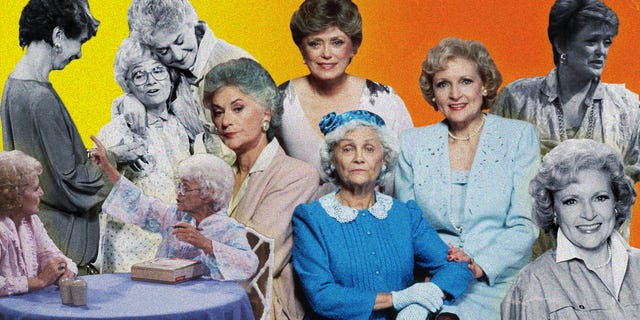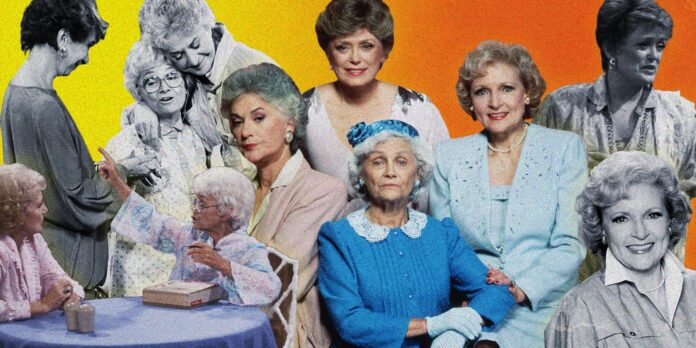
Shondaland Staff/Getty Images
Picture it: It’s a Tuesday in Beverly Hills, and the Golden Girls Kitchen is packed with guests. Fans of the 1980s show dine on thematic dishes like “Bacon Lettuce Potato Sandwich” and snap selfies in corners made up to resemble the show’s kitchen and Blanche’s Miami-chic bedroom. When the theme song comes up on the pop-up’s playlist of 1980s hits, everyone — even our waiter with a Shady Pines name tag — stops to sing along.
The Golden Girls Kitchen is a pop-up restaurant inspired by the series and the characters’ kitchen in Miami. The themed dining experience, which runs through the end of November in Los Angeles (and has upcoming events planned in New York, Miami, San Francisco, and Chicago), is just one sign that we’re not quite over our favorite pals and confidants. In April, fans packed Chicago’s Navy Pier for Golden-Con, a three-day event where attendees could get up close and personal with people and props from the sitcom. An Etsy search reveals 16,334 handmade Golden Girls items. And in July, BoJack Horseman director Mike Hollingsworth announced plans to use original sitcom audio to — no joke — bring our favorite foursome into the year 3033.
Not a bad cultural renaissance for a sitcom that finished its run in 1992. It’s worth acknowledging that there can be a direct line drawn between the events of the last few years (disease! war! loneliness of every flavor!) and our desire to binge on a show where any problem can be solved with a little help from our best friends and a lot of cheesecake. Even still, a sitcom about four middle-aged women living together in Miami wasn’t a guaranteed hit when it premiered 37 years ago. Between Maude, The Mary Tyler Moore Show, and Mama’s Family, Bea Arthur (Dorothy Zbornak), Betty White (Rose Nylund), Rue McClanahan (Blanche Devereaux), and Estelle Getty (Sophia Petrillo) were all known actresses. But ageism is real, and no one knew how relatable an all-female cast over the age of 50 could be.
Spoiler alert: They were very relatable.
Golden Girls was an instant Saturday night hit, even against Lucille Ball’s short-lived sitcom Life With Lucy. Women, understandably, enjoyed seeing themselves reflected on-screen. The gay community appreciated the ode to chosen family and living life on your own terms. (Bea Arthur was also a gay-rights activist in the 1970s, bringing a following with her from the start.) Surprisingly, even children tuned in — drawn in by Estelle Getty, whose small stature and one-liners made her an accidental petulant-child hero.
The actresses famously rejected lines that made someone the butt of a joke due to race, sexual orientation, or image. As a result, Golden Girls’ light touch helped them explore topics that might have been otherwise off-limits. They regularly explored the kind of tropes that compose “very special episodes” without falling into after-school-special territory.
Blanche struggles to accept her gay brother marrying his partner, until Sophia reminds her that “everyone wants someone to grow old with, and shouldn’t everyone have that chance?” Dorothy welcomes her son’s Black fiancée, only to balk when she finds out that she’s twice his age. Ultimately, her acceptance comes with discovering her would-be daughter-in-law is pregnant. And thanks to Blanche’s unabashed sexuality, nearly every episode has enough naughty jokes to fill an entire BuzzFeed list — not bad when you consider that in the 1980s, post-menopausal life usually came with raised necklines and lowered hemlines.
This content is imported from YouTube. You may be able to find the same content in another format, or you may be able to find more information, at their web site.
The Golden Girls might have pushed the envelope and created the kind of honesty that Sex and the City would later rely on. But even when things got tense on the set, (“Unable to stop myself, all I need is a letter sweater and pom-poms,” White wrote in Betty White in Person of her cheerleader tendencies. “One night, all three of those ladies are going to deck me”), they still made plenty of fans. Queen Elizabeth, the Queen Mother, reportedly regularly tuned in and invited the stars of the show to perform live at 1988’s Royal Variety Performance in London, albeit with the more risqué bits edited out for the stage and royal audience.
Each lead actress won an Emmy — and after the show’s run, Betty White won two more just for playing herself on The John Larroquette Show and Saturday Night Live. By the time the show aired its series finale in 1992, 27 million people were watching. (Compare that to the 19.3 million viewers who tuned in to the final episode of Game of Thrones.) The popularity was so lingering that 12 years later when The O.C. — a show squarely aimed at teenagers — aired an episode with multiple Golden Girls references, it didn’t seem dated so much as charming.
It’s no wonder that after White’s passing on December 31, 2021, fans all agreed that 99 years with her weren’t nearly enough, and grief viewing sent the show back to the top of the Nielsen charts. Who would want to say goodbye to these pals and confidants? Ultimately what keeps us heading to conventions, dining at pop-ups, and taking photo ops in 1980s beige-hued kitchens that symbolize not only an era but a piece of television history is kindness. The Golden Girls showed us a different way of thinking about our future that’s full of inclusion and self-made possibility, and did it with an undeniable sense of humanity. Almost 40 years ago, they threw a party, and even today, fans are still getting the biggest gift.
Laura Studarus is a Los Angeles-based travel writer who has contributed to Fast Company, BBC Travel, and Thrillist. Follow her on Twitter at @Laura_Studarus.
Get Shondaland directly in your inbox: SUBSCRIBE TODAY









